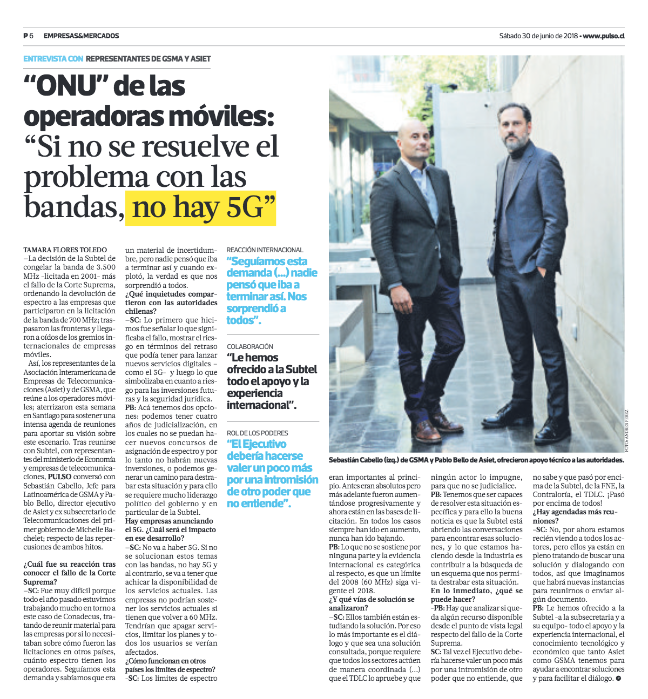- International industry associations underscore the need to maintain legal certainty and security to boost investor confidence in Chile.
- Spectrum limits imposed in the last decade are anachronistic, detrimental to users and a threat to the investment needed for 4G expansion and 5G rollout.
- If the situation is not remedied, Chile will be unable to move towards 5G in the coming years, delaying the country’s technological development.
- The Government of Chile, through the Department of Telecommunications (Subtel) and with the support of the industry, is the obvious choice to lead the search for solutions to achieve President Piñera’s connectivity goals.
29 June 2018. The Inter-American Association of Telecommunications Companies (ASIET) and the GSMA (worldwide association of the mobile ecosystem) recognise the regional leadership gained by Chile in recent years and positively appraise the goals announced by President Piñera to advance in the development of digital infrastructure. The associations also emphasise the importance of ensuring a regulatory and institutional framework that provides appropriate legal certainty and security and encourages investment.
ASIET and the GSMA have expressed their general concern about the situation of spectrum in Chile, which was recently affected by a resolution on the 3.5 GHz band and a Supreme Court decision on the 700 MHz auction requiring operators to return spectrum. The two associations consider this decision weakens the institutional framework of the sector because it contravenes the public policy of the governments of Presidents Piñera and Bachelet and the opinions of the National Economic Prosecutor’s Office (FNE) and the Antitrust Tribunal (TDOC). It is essential to strengthen the institutional framework and implement appropriate mechanisms to enable state decisions to deliver predictability and transparency in a context that gives companies confidence.
 The availability of spectrum for mobile services is a key factor in bridging the digital divide and achieving connectivity infrastructure that will aid economic development and promote competition, coverage and quality in the services provided to consumers. Technology requirements in 2018 clearly differ from those of 10 years ago, when few people had smartphones and there was no ecosystem of converged apps and services. From a technical and economic perspective, a clearly anachronistic spectrum cap cannot be maintained. If the cap had continued into this decade, Chile would not be a leader in the Latin American digital ecosystem and Chileans would not enjoy the quality and range of services they now have. The Supreme Court decision is detrimental to users and endangers the investment required for 4G expansion and 5G rollout, which Chile was expected to lead in the region. It is now necessary to explore options to remedy this situation. Chile must avoid judicialisation, uncertainty and institutional wrangling if it aims to secure the investment needed to move towards 5G under the present government.
The availability of spectrum for mobile services is a key factor in bridging the digital divide and achieving connectivity infrastructure that will aid economic development and promote competition, coverage and quality in the services provided to consumers. Technology requirements in 2018 clearly differ from those of 10 years ago, when few people had smartphones and there was no ecosystem of converged apps and services. From a technical and economic perspective, a clearly anachronistic spectrum cap cannot be maintained. If the cap had continued into this decade, Chile would not be a leader in the Latin American digital ecosystem and Chileans would not enjoy the quality and range of services they now have. The Supreme Court decision is detrimental to users and endangers the investment required for 4G expansion and 5G rollout, which Chile was expected to lead in the region. It is now necessary to explore options to remedy this situation. Chile must avoid judicialisation, uncertainty and institutional wrangling if it aims to secure the investment needed to move towards 5G under the present government.
We trust that the Government of Chile, through Subtel, will lead the search for solutions with a pragmatic and consultative approach. In this context, ASIET and the GSMA are available to the public authorities and will contribute all their technical knowledge and international experience to aid dialogue. The current situation can be remedied only through government leadership, through Subtel, to create the conditions that will help to achieve the investment commitments and connectivity goals announced by Piñera.